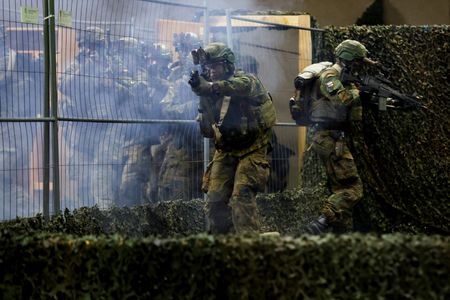By Sabine Siebold
(Reuters) – The German military will be armed with loitering munitions, or exploding drones, for the first time, two defense ministry sources said on Thursday, as Berlin tries to catch up with a technology that has shown its destructive power in Ukraine.
Both Russia and Ukraine have fielded such single-use drones, which cruise towards their target before plummeting at velocity and detonating on impact.
But the procurement of armed drones has been controversial in Germany, with some politicians associating them with targeted extrajudicial killings by U.S. forces in Afghanistan.
It took years of heated debate before parliament agreed in 2022 to enable a large drone such as the Heron TP, which flies at much higher altitudes, to carry arms.
However, military upgrades are more urgent now for Germany, amid the continuing war between Russia and Ukraine and doubts about the future of U.S. military protection.
Last month, parliament approved plans for a defence spending surge worth hundreds of billions of euros.
Contracts with two companies for a first batch of exploding drones will be signed in the coming days, the sources said, declining to name the companies. The army, air force and navy will test them in the following months.
“The use of drones and the defence against drones is crucial for the survival of our troops on the modern battlefield, that’s something we learned in Ukraine,” said one of the sources, who spoke on condition of anonymity.
“Each soldier must be capable of operating drones, just as today, everybody knows how to use binoculars.”
Germany will aim to sign longer-term contracts by the end of the year for a larger number of drones, shortening the period for introducing new weapons which usually takes years.
As drone technology evolves rapidly, the deals will specify that companies supply a limited number initially for training purposes, and that they may be asked later to supply a larger number of the latest models at short notice, if needed.
“There’s no use in purchasing thousands of drones … only to realise they are outdated by the time we need them,” one of the sources said.
(Reporting by Sabine Siebold, editing by Andrew Gray and Bernadette Baum)










